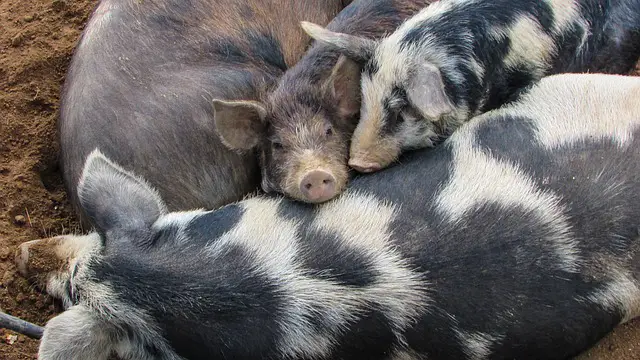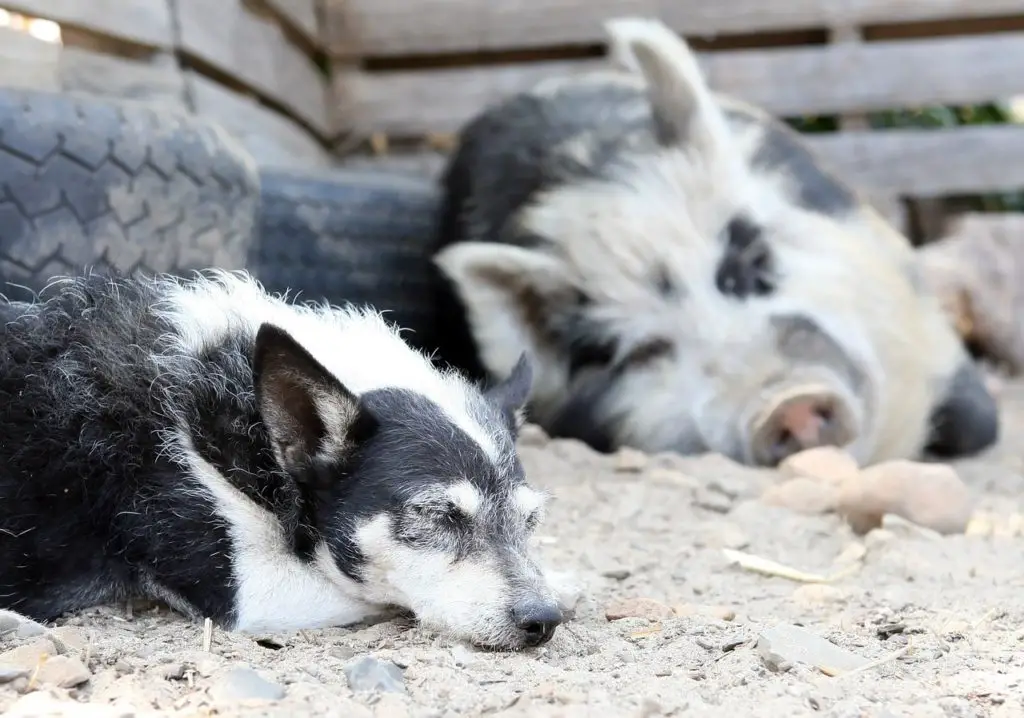One of the most common questions in pig owners’ minds is whether they should get another pig to serve as a companion for their current pet.
Do pigs really need other pigs? Pigs actually thrive in the company of other pigs. They are highly social creatures and love the company of animals that have the same needs and wants.
You can notice the kind of behavior they display inside pig pens where there are a number of pigs in a single cluster. They snuggle against each other a lot not just because of a lack of space, but because they love giving and receiving affection.
So does this mean that as a pig parent, you should get another pig (or maybe more) to make sure your pig is happy?

Well, not necessarily.
The great news is, you can give your pig the amount of affection and emotional support that it needs if you have the time, and if you’re willing to put some effort into it. (Although of course, another pig around the house wouldn’t really hurt.)
A Pig’s Social and Emotional Nature
Looking into a pig’s true nature is actually quite interesting. It makes you think about how little we really know about pigs in the first place.
Remember that pigs have always been preyed upon. Out in the wild, they are plucked right out of the earth by predators. In farms, they are slaughtered and sold in the market as a protein source.
No wonder pigs love having other pigs around them. It’s a sort of security blanket for them. After all, who else would know every single fear and apprehension a pig has more than other pigs?
Of course, there’s no need to overdo it as well.
One of the biggest issues inn pig farms nowadays is overcrowding, a problem that leads to more serious problems like disease. Pigs may also love the company, but it may also feel sad and depressed if it doesn’t have enough space of its own because there are just too many pigs around it.
But at the end of the day, pigs don’t necessarily have to receive this emotional support from other pigs. Humans can supply this as well, although a little more effort is required.
Pigs and Humans
A lot of people adopt pigs as pets because they see it as a suitable companion. What people should not forget, is that humans should also serve as companions to the pigs.
What does this mean?
Pig owners should not just think about their own convenience when caring for their pet pig. They should also think about a pig’s emotional and social needs, which should be provided on a regular basis.
You may notice that at the start, your pig does not want to be held or touched. This is normal. You’d have to put in some time to build your pig’s trust in you. Once the trust is built, only then will your pig start to open up to you and become more open to affection.
This is why it is important to first assess whether you really have the capacity to take care of a pig as a pet. It’s not just a question of whether you have the resources or the space. It’s also a question of whether you have the patience and the time to really build a strong relationship with it.
Other Animals Pigs Get Along With
You also have the option of keeping other animals that could keep your pig company. Just make sure that it’s an animal that your pig can get along with.
It’s normal for a lot of households to have dogs, but if you also plan on having a pet pig, you might have to think twice.

Dogs are natural predators and can be quite impatient with pigs. Remember that pigs are playful in nature, so it may attempt to snuggle against a dog, which may end up irritating your dog. A dog’s growl can be enough to traumatize a pig.
Cats may be seen as more irritable than dogs, but surprisingly, a cat’s don’t-care attitude is more suitable for pigs. Plus, they both love snuggling, which usually makes it all work out in the end. At best, the pig and cat may end up not caring for each other but also not getting in each’s other’s way, which still give you a peaceful ending.
Other animals that a pig often gets along with are horses, goats, and sheep.
How to Get Your Pig to Bond With You
Now that you understand a pig’s emotions and temperament, you can finally see why having another pig (or a whole bunch of them) to keep your pet company is important. However, it’s also important to look at your own capacity as well. After all, if you haven’t adjusted to having one pig in your household yet, how sure are you that you’ll be able to take care of a few more?
Here are a few tips on how you can get your pig to open up to you emotionally in case you’re not yet ready to provide a pig companion for it.
- Start small.
Bonding with a new pig is not done suddenly. You have to take small steps to hit the big time.
Before going all in for hugs and cuddles, start with small affectionate strokes on her head first. Let your pig be the one to show you that it’s ready to go to the next level.
When you notice your pig warming up to you, you can go ahead and give it belly rubs or scratches around the ears. That should help break down the pig’s walls until it starts letting you cuddle with it.
- Don’t pressure the pig.
Don’t force the pig to come to you or to snuggle against another family member, especially if it’s evident that the pig has not warmed up to you or to the other people around you just yet.
The more that a pig is pressured, the more it will retreat emotionally. You’ll notice the pig sulking more often, and eventually, as the pressure mounts, you’ll notice that it will refuse to come near you. This is something that you don’t want to happen, because the walls that an emotionally unwell pig builds around it becomes tougher to break.
- Mind your tone of voice.
Pigs will not appreciate you talking to it sternly or cruelly. Even if you don’t hurt it physically, the huge emotional blow that it gets when you shout or scream at it will be even worse.
Make sure you talk to it gently at all times. Keep your tone of voice down. This tends to calm down the pig and will also make it trust you and see you as someone who will not be a threat.
- Play with it regularly.
They say that the best gift you can give your loved one is time and attention. This is one philosophy that you should apply to your pig as well.
Set a regular time for training and play. Provide toys that will not only keep your pig physically active, but keep it stimulated mentally as well.
Pigs see the effort that you put in. The more time you spend on its enjoyment, the easier it will trust you and open up to you as well.
Related Questions
How long do pigs live?
Pigs can actually live up to 20 years, but its life expectancy also depends on the kind of environment it lives in. Pigs out in the wild, for example, would only average 5 to 6 years because of the high risks. A lot of mini pigs only live up to 5 years as well, usually because the attempt to keep it smaller that it’s supposed to be compromises its health.
What do pigs eat?
Pigs are omnivores, so it can eat both plants and animals. They are natural foragers, so they’re used to eating leaves, fruits, roots, and flowers. In farms, they are often fed grains and soybean meals. Although they also have the ability to eat meat, it is usually not recommended because they may contract a number of diseases from it.
Do pigs hold grudges?
Pigs have amazing memories and can remember how to get home or where it found food before. But more importantly, pigs can remember other animals and people that have hurt or offended it before. You’ll see it change its demeanor towards somebody who hit it, for example. Where it may be open and friendly to others, it may shun away or hide from people who have caused trauma to it.

